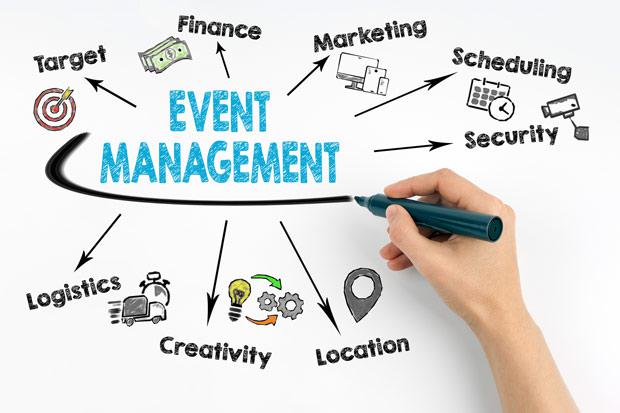The connection between charlotte event companies and customer retention
Wiki Article
Understanding Everything About Event Management and Its Role in Successful Events
Event management is a crucial aspect in the execution of successful events. It involves cautious planning and control to ensure that every aspect straightens with the desired vision. From business events to social celebrations, the performance of event management can considerably affect guest experience. Comprehending the nuances of this area reveals even more than just logistics - charlotte event companies. The intricacies of interaction, budgeting, and assessment play essential duties fit results. What are the key components that truly drive success?The Importance of Event Management
Event management plays a necessary function in assuring the success of any event, whether it be a business conference, wedding celebration, or event. It incorporates the preparation, organization, and implementation of events, which requires precise focus to information and a structured technique. Effective event management assists create remarkable experiences for attendees, promoting involvement and complete satisfaction.Efficient occasion management can enhance source allocation, ensuring that spending plans are stuck to while making best use of the effect of the event. It includes working with numerous elements such as place option, supplier management, and logistics, all of which add to a smooth experience.
Additionally, effective event management can alleviate prospective risks and challenges, preparing for unforeseen issues that might arise. By prioritizing interaction and partnership among stakeholders, occasion managers can guarantee that purposes are met, bring about successful outcomes and favorable feedback from individuals. Ultimately, the relevance of event management hinges on its capability to transform visions right into fact.
Key Components of Event Preparation
In occasion preparation, numerous vital parts are crucial for success. Spending plan management methods, venue selection pointers, and timeline advancement essentials form the structure of a reliable plan. Each of these components plays a significant duty in making certain that an occasion runs smoothly and satisfies its objectives.
Budget Plan Management Techniques
Effective spending plan management is a cornerstone of successful event planning. It involves precise allowance of sources to ensure that all aspects of the occasion are effectively funded. A comprehensive budget plan should consist of categories such as venue, wedding catering, enjoyment, advertising and marketing, and backup funds for unexpected costs. To keep financial control, organizers must track expenditures carefully and on a regular basis compare them against the spending plan. Using budgeting software application can streamline this procedure, offering real-time updates on financial standing. In addition, obtaining multiple quotes from suppliers can aid recognize affordable services without jeopardizing top quality. By establishing clear top priorities and adhering to a well-structured budget plan, event managers can navigate financial obstacles and improve the general success of the occasion.Location Option Tips
Choosing the best venue is crucial for any type of successful event, as it sets the stage for the overall experience. When choosing a place, event coordinators need to take into consideration factors such as area, ability, and access. The location ought to be quickly reachable for attendees, ideally located near transportation alternatives. In addition, the dimension must accommodate the expected variety of visitors easily, with room for any planned tasks. Organizers need to likewise examine the location's services, consisting of audiovisual devices, seating arrangements, and catering choices. Budget plan restraints play a considerable role; therefore, recognizing the overall prices, including hidden fees, is essential. Seeing the location ahead of time allows for a direct evaluation and helps ensure it lines up with the occasion's vision and demands.Timeline Growth Essentials
A well-structured timeline is vital for effective occasion planning, serving as a roadmap that guides coordinators through each stage of the process. Secret components of timeline growth include setting target dates for each job, from initial concept to event implementation. Planners must focus on activities, such as securing suppliers, verifying the location, and advertising the occasion. On a regular basis upgrading the timeline assures that all stakeholders continue to be informed and liable. Additionally, integrating buffer times for unforeseen hold-ups can help keep total momentum. It is crucial to line up the timeline with the occasion's objectives and resources, permitting effective allocation of time and spending plan. Inevitably, a well-crafted timeline enhances control and promotes an effective event experience for both planners and attendees.The Duty of Interaction in Events
Reliable interaction is crucial in event management, making sure that messaging is clear and constant. It assists in coordination among different stakeholders, which is crucial for a smooth execution. Additionally, having robust crisis interaction strategies in position can significantly reduce obstacles that might occur during an event.Value of Clear Messaging
Clear messaging acts as the foundation of effective event management, guaranteeing that all stakeholders-- participants, sponsors, and coordinators-- are aligned in their assumptions and understanding. Effective interaction fosters count on and openness, enabling clear goals and wanted results to be expressed. When messages are succinct and regular, they decrease the threat of misconceptions and false impressions, which can result in functional inefficiencies. Clear messaging enhances participant engagement, as individuals are much more most likely to connect with an occasion when they comprehend its purpose and relevance. Furthermore, it assists in advertising and marketing efforts, allowing enrollers to acknowledge the worth of their investment. charlotte event companies. Eventually, clear messaging is vital for developing a cohesive experience that reverberates with all involved, facilitating the total success of the occasionControl Amongst Stakeholders
Effective occasion management relies heavily on smooth sychronisation among stakeholders, where interaction plays a critical role. Efficient interaction assurances that all events, including suppliers, sponsors, and team members, are aligned with the event's objectives and timelines. Normal updates and clear directives cultivate a collaborative atmosphere, lessening misconceptions and improving efficiency. Stakeholders should establish open channels of interaction, using tools such as e-mails, meetings, and job management software program to track development and address worries without delay. Moreover, comprehending each stakeholder's function and duties improves liability, ensuring that tasks are executed as intended. Ultimately, well-coordinated communication among stakeholders is necessary for navigating the intricacies of occasion planning, causing an effective and remarkable occasion experience for all involved.Effective Situation Communication Techniques
Exactly how can event supervisors guarantee that they are planned for unpredicted obstacles? Effective dilemma interaction techniques are necessary for managing unexpected situations during occasions. To start with, occasion supervisors should develop clear interaction networks, making specific all stakeholders are informed without delay. Establishing a situation communication strategy in advance permits for quick action, describing functions and responsibilities. Furthermore, educating team to reply to situations ensures that the team is geared up to deal with emergency situations properly.Using numerous communication systems, such as social networks, email, and public announcements, assists get to varied audiences rapidly. Normal updates during a crisis preserve transparency and construct trust among attendees. Inevitably, learn this here now proactive preparation and clear interaction can substantially alleviate the adverse effect of dilemmas, leading to successful event management, even in difficult circumstances.
Budgeting and Financial Management
Budgeting and economic management are necessary components of efficient event preparation, as they frequently identify the overall success of the event. A well-structured spending plan functions as a roadmap, outlining awaited expenditures and profits streams. This financial plan helps occasion supervisors designate sources efficiently and stay clear of overspending.Crucial element of budgeting include location costs, event catering, amusement, advertising, and staffing. Each expenditure has to be meticulously approximated and monitored throughout the preparation process. Financial management likewise entails tracking income sources, such as ticket sales and sponsorships, to ensure economic feasibility.
Normal economic reviews permit occasion planners to readjust their methods as needed, mitigating risks connected with unforeseen expenses. By preserving clear economic documents, occasion supervisors can show liability to stakeholders and enhance future planning efforts. Ultimately, effective budgeting and monetary management prepared for delivering memorable events while accomplishing organizational goals.

Logistics and Operational Planning
A well-structured budget plan lays the foundation for effective logistics and operational planning in occasion management. It enables occasion planners to designate sources successfully, guaranteeing that all logistical aspects align with the overall vision. Key parts consist of location option, transport plans, and equipment purchase. charlotte event companies. Organizers must prepare for the requirements of guests, vendors, and team, guaranteeing smooth control throughout the occasionOperational planning likewise incorporates staff projects and training, making sure all team participants recognize their duties. Communication is essential; for that reason, developing clear channels among stakeholders minimizes misconceptions. Additionally, contingency plans for unexpected situations, such as inclement climate or technical failings, are vital to preserve smooth procedures.
Eventually, the success of an occasion heavily relies upon meticulous logistics and operational planning. By focusing on these facets, planners can produce remarkable experiences while sticking to budget restrictions and timelines, therefore achieving organizational objectives.
Marketing and Promo Approaches
While reliable logistics and operational planning develop the foundation of event management, successful advertising and promo strategies are necessary for bring in attendees and making sure a high level of involvement. These methods often begin with determining the target audience, which allows occasion coordinators to tailor their messaging and select appropriate interaction networks. Making use of social networks systems, email advertising, and partnerships with influencers can considerably intensify reach and presence.Creating engaging web content such as video clips, blog sites, and graphics can produce passion and enjoyment around the occasion. Early bird ticket offers and advertising discount rates likewise function as effective motivations for potential attendees. Involving narration and clear phone call to action are essential in transforming passion right into real participation. Furthermore, leveraging analytics assists in examining the effectiveness of advertising and marketing initiatives, allowing organizers to change techniques in real-time. Collectively, these components add to a look at this now successful event that reverberates with its audience.
Reviewing Event Success and Responses
Successful analysis of event success and feedback is essential for constant improvement and lasting development in event management. This procedure includes systematically collecting and assessing data connected to different aspects of an occasion, including participant contentment, logistical execution, and total effect. Studies, interviews, and emphasis groups prevail approaches used to collect qualitative and quantitative comments from participants.Key efficiency indications (KPIs) such as presence numbers, earnings generation, and social media sites interaction additionally play an important role in measuring success. By evaluating this details, event supervisors can identify staminas to construct upon and weaknesses to deal with in future occasions.
Moreover, comments permits for adjustments to be made in real-time, improving the participant experience and fostering commitment. Inevitably, an extensive analysis procedure not just informs future planning however additionally adds to a more robust track record for the event management team, guaranteeing sustained success in an affordable landscape.

Often Asked Concerns
What Certifications Are Needed to End Up Being an Event Manager?
To end up being an event manager, individuals typically require a combination of appropriate education and learning, such as a degree in hospitality or business management, and practical experience in preparation, arranging, and Visit Website executing different sorts of occasions efficiently.How Do I Choose the Right Location for My Event?
Selecting the ideal location includes reviewing the occasion's objective, ability, area, amenities, and spending plan. A thorough testimonial assurances that the location lines up with the event's goals and enhances the total experience for guests.What Innovation Devices Are Essential for Event Management?
Essential technology tools for occasion management consist of registration software application, event apps, ticketing systems, project management tools, and analytics software. These sources simplify planning, boost guest involvement, and assist in communication, inevitably adding to an effective event experience.How Do I Handle Unanticipated Problems During an Occasion?
To take care of unforeseen problems throughout an occasion, one should continue to be calm, assess the scenario, interact efficiently with the team, carry out pre-planned contingency actions, and adjust rapidly to guarantee very little disruption to the total experience.What Are the Most Current Fads in Event Management?
The latest trends in event management consist of online and hybrid styles, sustainability techniques, customized attendee experiences, enhanced use of innovation, and immersive atmospheres. These patterns aim to create more appealing and remarkable experiences for participants.Report this wiki page